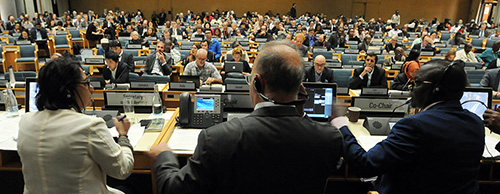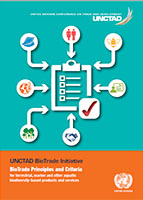The BioTrade Principles and Criteria (P&C) provide a framework and a set of guidelines for economic actors to embrace sustainable practices that support the conservation and sustainable use of biodiversity, and the fair and equitable sharing of benefits that promote economic and inclusive growth. The P&C are implemented and fostered by government organizations, intergovernmental organizations (IGOs), business associations, non-governmental organizations (NGOs), companies, community organizations and others in over 80 countries.
Benefits of the BioTrade P&C for governments:
- Create incentives to economic actors to promote the adoption of economically and socially sound measures to conserve and sustainably use biodiversity, and the sharing of benefits.
- Diversify production and export-bases by enabling the sustainable use and transformation of biodiversity to develop new products, value chains and sectors.
- Provide guidance to economic actors to comply with local and national legislation as well as to implement practices that conserve and sustainably use biodiversity.
- Generate and protect livelihoods for local communities dependent on biodiversity, for example by sharing the benefits generated and contributing to sustainable local development.
- Conserve and protect traditional knowledge and the fair and equitable sharing of generated benefits by complying with applicable legal requirements and/or relevant contractual agreements, including mutually agreed terms and obtaining prior informed consent.
- Enable governments to develop an enabling environment that harmonizes socio-economic development with the conservation of nature.
- Demonstrate how trade conducted in accordance with sustainability principles and criteria such as the BioTrade P&C can support the achievement of the SDGs and help provide the basis for long-term sustainable and inclusive development.
- Support governments in achieving their commitments related to multilateral environmental agreements such as the Convention on Biological Diversity (CBD), the Aichi Biodiversity Targets, and Convention on International Trade in Endangered Species of Wild Fauna and Flora (CITES).
How Governments can support BioTrade
- Create positive economic incentives and engage actors such as indigenous peoples and local communities (IPLCs) and businesses in the conservation and sustainable use of biodiversity.
- Support cross-sectoral cooperation with the trade, economy, finance and environmental communities and others while aligning efforts towards favouring biodiversity and people.
- Tackle unsustainable consumption and production patterns that are detrimental to biodiversity and people, which are the beneficiaries of BioTrade.
- Increase the resilience of biodiversity-related sectors by fostering measures that prevent or mitigate negative environmental impacts, including climate change.
- Strengthen Access and Benefit Sharing partnerships which contribute to sustainable economic growth and decent work for all.
- Strengthen Access and Benefit Sharing partnerships which contribute to the development of national scientific research, innovation capacities, and infrastructure.
How trade can help in curbing biodiversity-loss
Trade is an indispensable component of national economies and involves governments, businesses, and societies. It is also related to biodiversity, as approximately 50 per cent of the world’s economy is dependent on nature and its services(WEF). Therefore, trade should be part of the solution to prevent biodiversity loss.
Governments worldwide can help and promote the conservation and sustainable use of biodiversity through trade by:
- Promoting and incentivizing the conservation and sustainable use of biodiversity while phasing out perverse incentives.
- Engaging with private sector actors (small, medium and large enterprises) in the conservation and sustainable use of biodiversity, and in access and sharing of benefits.
- Leveraging additional financial resources for biodiversity conservation and sustainable use.
- Supporting the mainstreaming of biodiversity, for example by promoting BioTrade to national trade promotion agencies and Ministries of Trade, Environment, Agriculture, Industry, Foreign Affairs and others.
- Helping economic and trade actors to seize opportunities to access international markets for sustainable products and services.
- Creating an enabling environment for the sustainable use biodiversity and commerce of its resources which generate income, wealth and economic security for livelihoods, particularly those that depend on those resources
Post-2020 Biodiversity Framework
Featured Publications




